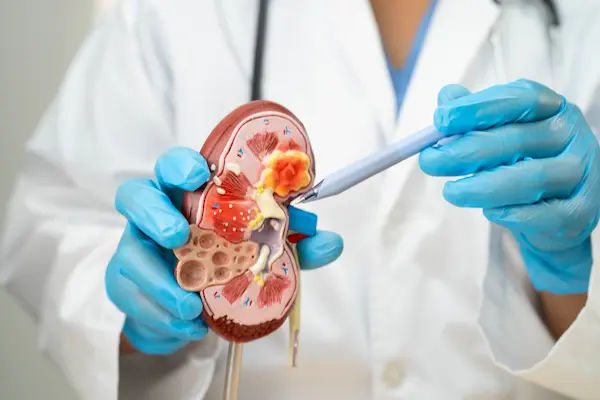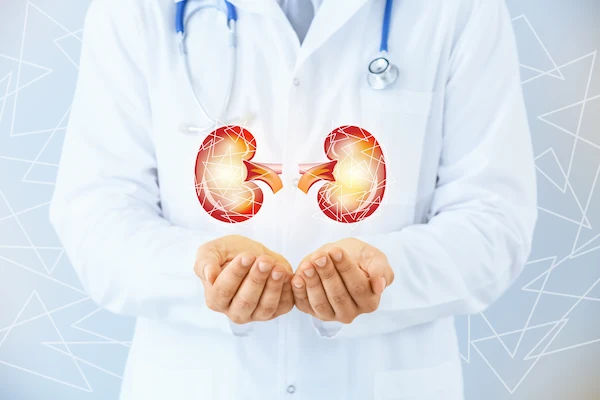Guide to Diet Kidney Stones
Learn how to prevent and manage kidney stones through diet. Our comprehensive guide covers the best foods to eat, foods to avoid, and essential tips for maintaining kidney health.

Written by Dr. Dhankecha Mayank Dineshbhai
Reviewed by Dr. M L Ezhilarasan MBBS
Last updated on 13th Jan, 2026
.webp?tr=q-80,f-webp,w-350,dpr-2,c-at_max 700w)
Your Diet Guide to Preventing Painful Kidney Stones
Introduction
If you've ever experienced the excruciating pain of a kidney stone, you're not alone—and you'll do almost anything to prevent a recurrence. What many people don't realize is that while genetics play a role, diet is one of the most powerful tools you have to influence your risk. This article serves as your comprehensive guide to diet for kidney stones, moving beyond simplistic "do and don't" lists to explain the why behind the recommendations. We'll demystify the roles of oxalates, calcium, sodium, and hydration, providing you with a clear, actionable plan to modify your eating habits. By understanding how these dietary components interact within your body, you can take proactive steps to dilute your urine and create an environment that's far less hospitable to the formation of these painful crystals. Let's transform your diet into your first line of defense.
Understanding Kidney Stones and The Diet Connection
What Are Kidney Stones?
Kidney stones are hard, crystalline mineral deposits that form inside your kidneys. They develop when your urine contains more crystal forming substances—such as calcium, oxalate, and uric acid—than the fluid in your urine can dilute. At the same time, your urine may lack substances that prevent crystals from sticking together, creating an ideal environment for stones to form. The most common type, accounting for about 80% of cases, is the calcium oxalate stone, which is where diet becomes critically important.
How Your Diet Influences Stone Formation?
Every bite of food and sip of fluid you consume can change the composition of your urine. Your goal is to create urine that is diluted and contains lower concentrations of stone forming minerals. A diet for kidney stones isn't about extreme elimination; it's about strategic balance. It focuses on increasing fluid intake, managing specific minerals like oxalate and sodium, ensuring adequate calcium from the right sources, and moderating elements that can make your urine more acidic, like animal protein.
The 1 Rule: Stay Hydrated to Dilute Your Urine
This is the single most important piece of advice for anyone looking to prevent kidney stones. Adequate fluid intake dilutes the substances in urine that lead to stones. Think of it like adding more water to a concentrated sugar solution; the sugar molecules are farther apart and less likely to crystallize.
How Much Water Should You Drink?
The golden rule is to drink enough fluids to produce at least 2 to 2.5 liters of urine per day. For most people, this translates to consuming about 3 liters (roughly 100 ounces or 12 cups) of fluid daily. A good visual indicator is the color of your urine—it should be light yellow or clear. If it's dark yellow, you need to drink more.
Consult a General Physician for the best advice
vention
Consult a General Physician for the best advice
- Best: Water is ideal. Lemon water (or lime juice) is excellent because it contains citrate, which helps prevent stone formation.
- Good in Moderation: Certain citrus juices like orange juice and grapefruit juice.
- Limit: Sugary sodas and drinks high in high-fructose corn syrup have been linked to a higher risk of
- stones. Also, be cautious with grapefruit juice for those prone to calcium oxalate stones.
Navigating Oxalates: The Biggest Dietary Culprit
For calcium oxalate stones, managing oxalate intake is crucial. Oxalate is a natural compound found in many plants, and when it binds with calcium in your intestines, it can be excreted harmlessly. But if there's too much oxalate and not enough calcium in your gut, the excess oxalate can be absorbed into the bloodstream and end up in the kidneys, where it binds with calcium to form stones.
What Are Oxalates and Why Do They Matter?
Oxalates are organic acids found in a wide variety of foods. Your body produces some itself, and you ingest the rest. The key is not to eliminate them entirely—many healthy foods contain oxalates—but to be aware of the very high oxalate foods and consume them sparingly, always paired with a source of calcium.
HighOxalate Foods to Limit
Spinach: Perhaps the most well-known high oxalate food.
- Rhubarb
- Almonds and cashews
- Beets
- Okra
- Sweet potatoes
- Soy products (tofu, edamame)
- Black tea
LowOxalate Alternatives to Enjoy
- Greens: Kale, iceberg lettuce, mustard greens
- Nuts/Seeds: Macadamia nuts, peanuts, pumpkin seeds
- Fruits: Apples, grapes, melons, peaches
- Vegetables: Cauliflower, cabbage, mushrooms, peas
- Grains: White rice, corn flour
The Calcium Paradox: Why You Shouldn't Cut Dairy
This is the most common misconception. People hear "calcium oxalate stone" and think they should avoid calcium. This is exactly the wrong approach and can actually increase your risk of stones.
The Critical Role of Dietary Calcium
Dietary calcium binds to oxalate in your stomach and intestines. This bound complex passes through your digestive system and is excreted in your stool. If you reduce your calcium intake, there's less calcium to bind with oxalate in your gut. This allows more oxalate to be absorbed into your bloodstream, eventually filtered by your kidneys, and excreted into your urine, where it can form stones. Therefore, a diet for kidney stones should include normal amounts of calcium-rich foods.
The Difference Between Calcium and Calcium Supplements
It's important to get your calcium from food sources like milk, yogurt, and cheese. Calcium supplements, if taken without food, may not bind effectively with oxalate and could potentially increase stone risk. If you need supplements, take them with a meal and discuss the type and timing with your doctor.
The Hidden Danger: Slashing Your Sodium Intake
A high-sodium diet is a major risk factor for kidney stones. Sodium causes your kidneys to excrete more calcium into your urine. High levels of calcium in your urine (hypercalciuria) are a primary driver of stone formation.
How Salt Leads to More Calcium in Urine?
When you consume too much sodium, your body works to excrete the excess through the kidneys. This process also pulls more calcium along with it, increasing the concentration of calcium in your urine and creating a prime environment for crystals to form with oxalate or phosphate.
Identifying Hidden Sodium in Your Diet
The obvious sources are table salt and salty snacks. The hidden dangers are:
- Processed meats (deli meat, bacon, sausages)
- Canned soups and vegetables
- Fast food
- Packaged sauces, dressings, and condiments
- Cheese and other dairy products
- Aim for less than 2,300 mg of sodium per day, and ideally closer to 1,500 mg if you are stoneprone.
Moderating Animal Protein: Impact on Urine Chemistry
Diets high in animal protein (red meat, poultry, fish, eggs) can increase the risk of two types of stones: calcium stones and uric acid stones.
How Meat, Poultry, and Fish Increase Stone Risk?
Animal protein increases the acid load in your body. To neutralize this acid, your body leaches calcium from your bones and releases it into the urine. It also reduces levels of citrate, a key chemical in urine that prevents stones from forming. Furthermore, purines in animal protein break down into uric acid, which can crystallize into stones.
Strategies for Balancing Protein Sources
You don't need to become a vegetarian, but consider adopting a "flexitarian" approach. Try having several meatless meals each week, using plant-based proteins like lentils, chickpeas, and quinoa. When you do eat animal protein, keep portion sizes moderate (about the size of a deck of cards).
The Power of Citrate: Your Natural Stone Inhibitor
Citrate is a powerful inhibitor of kidney stone formation. It works by binding with calcium in the urine, preventing it from crystallizing with oxalate or phosphate. It can also prevent existing small crystals from growing and clumping together.
What is Citrate and How Does it Help?
Citrate is a compound found in citrus fruits. In the urine, it acts like a shield, making it harder for stones to form. Low urinary citrate is a common finding in people who form kidney stones.
Top Food Sources of Dietary Citrate
The easiest way to increase your citrate levels is to incorporate lemon juice into your daily routine. Squeezing the juice of one or two fresh lemons into a large glass of water each day is a highly effective and natural strategy. Other good sources include limes, oranges, and melons.
Putting It All Together: A Sample KidneyStoneFriendly Meal Plan
Here’s what a day on a stone prevention diet might look like:
- Breakfast: Bowl of oatmeal made with low fat milk, topped with a handful of blueberries and a tablespoon of pumpkin seeds. A glass of water with a squeeze of lemon.
- Lunch: Large salad with grilled chicken (small portion), iceberg lettuce, cucumbers, red peppers, and a sprinkle of feta cheese. Dress with olive oil and vinegar.
- Snack: An apple with a tablespoon of peanut butter.
- Dinner: Baked salmon (moderate portion) with a side of steamed cauliflower and quinoa.
- Hydration: Water, herbal tea, or more lemon water throughout the day.
Conclusion
Managing your diet is your most powerful weapon in the fight against kidney stones. It’s not about drastic restrictions but about understanding the science of balance: diluting your urine with plenty of fluids, ensuring calcium and oxalate meet in your gut rather than your kidneys, and reducing elements like sodium and excess animal protein that disrupt this delicate equilibrium. By incorporating these principles—prioritizing hydration, making smart food pairings, and choosing whole foods over processed ones—you can significantly reduce your risk of another painful episode. Remember, these are general guidelines. If your condition does not improve after trying these methods or you experience severe pain, book a physical visit to a urologist with Apollo24|7 for a definitive diagnosis and a personalized prevention strategy. Take control of your diet, and take control of your kidney health.
Consult a General Physician
Consult a General Physician

Dr. J T Hema Pratima
General Practitioner
9 Years • MBBS, Fellowship in Diabetes Mellitus
Chennai
Apollo 24|7 Clinic - Tamilnadu, Chennai
(350+ Patients)

Dr Divya Lekha Gunta
General Practitioner
10 Years • MBBS, MD (Pathology)
Visakhapatnam
Apollo 24|7 Clinic - Andhra Pradesh, Visakhapatnam

Dr. Siri Nallapu
General Practitioner
5 Years • MBBS
Hyderabad
Apollo 24|7 Clinic, Hyderabad

Dr. Rajib Ghose
General Physician/ Internal Medicine Specialist
25 Years • MBBS
East Midnapore
VIVEKANANDA SEBA SADAN, East Midnapore

Dr. Ramya Hari
General Practitioner
18 Years • Medical Head & Family Physician, DG Shipping Approved Doctor, Panel Physician - UK Visa Medicals
Chennai
Apollo Medical Centre Kotturpuram, Chennai
Consult a General Physician for the best advice

Dr. J T Hema Pratima
General Practitioner
9 Years • MBBS, Fellowship in Diabetes Mellitus
Chennai
Apollo 24|7 Clinic - Tamilnadu, Chennai
(350+ Patients)

Dr Divya Lekha Gunta
General Practitioner
10 Years • MBBS, MD (Pathology)
Visakhapatnam
Apollo 24|7 Clinic - Andhra Pradesh, Visakhapatnam

Dr. Siri Nallapu
General Practitioner
5 Years • MBBS
Hyderabad
Apollo 24|7 Clinic, Hyderabad

Dr. Rajib Ghose
General Physician/ Internal Medicine Specialist
25 Years • MBBS
East Midnapore
VIVEKANANDA SEBA SADAN, East Midnapore

Dr. Ramya Hari
General Practitioner
18 Years • Medical Head & Family Physician, DG Shipping Approved Doctor, Panel Physician - UK Visa Medicals
Chennai
Apollo Medical Centre Kotturpuram, Chennai
More articles from Kidney stones
Frequently Asked Questions
Is lemon water good for kidney stones?
Yes, absolutely. Lemon water is one of the best drinks for prevention. Lemons are high in citrate, a natural compound that helps prevent calcium crystals from forming into stones. Aim for the juice of two lemons diluted in water throughout the day.
What are the worst foods for kidney stones?
The worst offenders are foods extremely high in oxalates (like spinach, rhubarb, and nuts), high-sodium processed foods (chips, canned soups, deli meats), and excessive animal protein (red meat, organ meats). Sugary sodas are also linked to higher risk.
Can I ever eat high oxalate foods again?
Yes, moderation is key. You don't have to eliminate them completely. The strategy is to pair a high oxalate food with a calcium-rich food at the same meal. For example, if you have spinach, eat it with a cheese sauce or milk. The calcium will bind the oxalate in your gut.
How does a high sodium diet cause kidney stones?
A high sodium diet causes your kidneys to excrete more calcium into your urine. This high concentration of calcium in the urine can then easily bind with oxalate or phosphate to form stones. Reducing sodium is one of the most effective ways to lower urinary calcium.
What is the best drink besides water for kidney stone prevention?
Citrus-based fluids are excellent. Freshly squeezed orange juice and lemonade (without excessive sugar) are good choices due to their citrate content. Herbal teas like rooibos are also low in oxalates. It's best to avoid dark colas and sweetened beverages.


